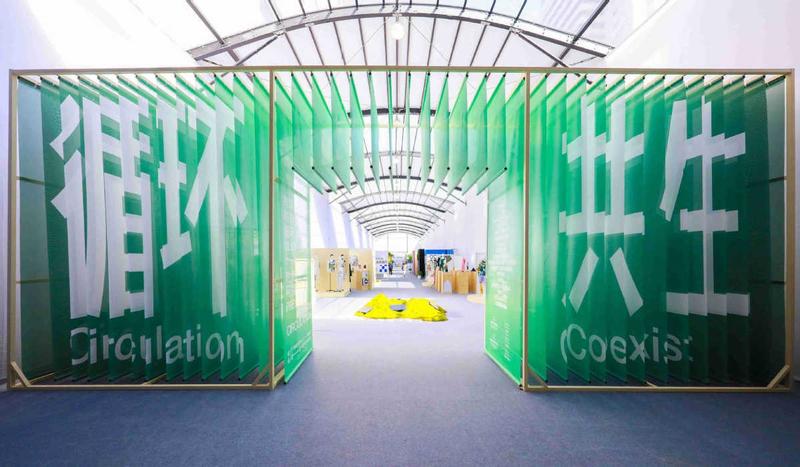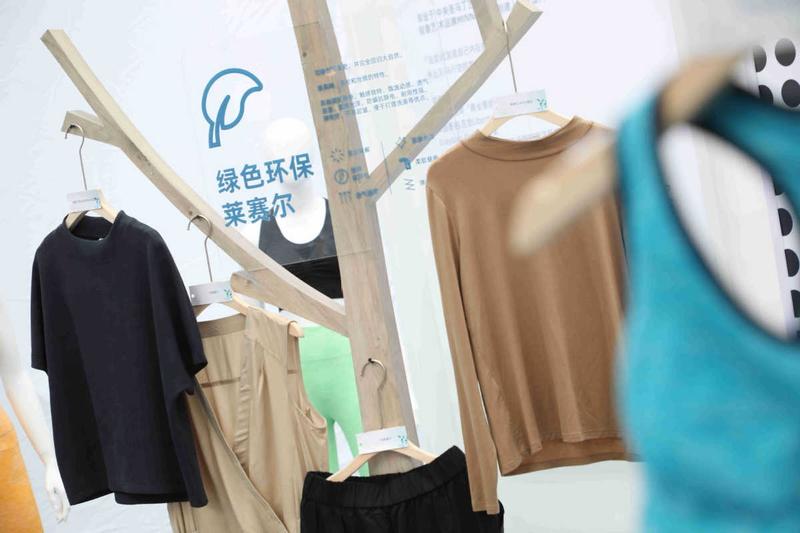Sustainability fast gaining traction in sector
 Reclothing Bank showcases its environmentally friendly collection at the MODE trade show during the 2021 Autumn/Winter Shanghai Fashion Week last month. (PHOTO PROVIDED TO CHINA DAILY)
Reclothing Bank showcases its environmentally friendly collection at the MODE trade show during the 2021 Autumn/Winter Shanghai Fashion Week last month. (PHOTO PROVIDED TO CHINA DAILY)
Sustainability was the watch-word at the 2021 Autumn/Winter Shanghai Fashion Week, with nearly half the brands that launched new collections integrating environmental protection concepts into their products, according to organizers.
The brands included Reclothing Bank, which raised eyebrows last month at MODE Shanghai, the event's trade show, with its display of a blue "fur" coat made from fully degradable corn fiber.
Sustainable development is an inevitable trend, and apart from using sustainable raw materials, companies in the textile industry should upgrade their production facilities to reduce energy consumption and become more environmentally friendly
Sun Jian, vice-president of communications and sustainability at Sateri
Zhang Na, founder of Reclothing Bank, a local label that has used sustainable materials since its launch in 2011, said: "Nature is full of creativity. We use recycled bottles to develop hundreds of fabrics. We salvage discarded fishing nets to make renewable nylon, and we have now turned some crops, including corn stubble, into degradable fur."
Other local brands to jump on the sustainability bandwagon include Mithworld, which launched a new collection of clothes made from plant fibers, and Tuyue, which showcased garments crafted from recycled materials.
Yang Yingying, founder of Tuyue, said: "Since the pandemic emerged, we have shifted our focus from the connection between humans and ego to that between humans and nature. Sustainability is one of our core tasks now."
Awareness of the importance of sustainability has also been rising among consumers.
More than 67 percent of consumers said they pay attention to sustainable fashion products, while 26 percent would buy such products, according to a survey in 2019 by the China National Textile and Apparel Council's Office for Social Responsibility. Only 2 percent of respondents said they were not interested in sustainable products.
Wang Qi, professor of marketing at the China Europe International Business School, said that as the world's second-largest polluting industry (after oil), the fashion sector's impact on the environment needs to be addressed urgently.
The industry's carbon emissions account for nearly 10 percent of the total, and are even higher than such discharges from the aerospace industry, Wang said.
The biggest source of carbon emissions in the fashion industry is the use of petroleum to produce fiber, she added.
According to the China National Textile and Apparel Council, the country produced 54.6 million metric tons of fibers in 2018, with 83 percent of them synthetics derived from petroleum.
However, the situation is changing globally, with players throughout the supply chain, including yarn producers and textile manufacturers, channelling resources and efforts into addressing the problem.
 Recycled brands and materials are displayed at the show. (PHOTO PROVIDED TO CHINA DAILY)
Recycled brands and materials are displayed at the show. (PHOTO PROVIDED TO CHINA DAILY)
In March, at the Intertextile Shanghai Apparel Fabrics and the Yarn Expo Spring shows in Shanghai, sustainable materials were in the spotlight, with textile companies from around the world jostling to attract customers keen to embrace sustainability.
The China Fibers Fashion Trends Report for 2021 to 2022 cites "green fiber", including biodegradable, natural, regenerated and recycled fibers, as the industry's top trend.
Duan Xiaoping, chairman of the China Chemical Fibers Association, said: "With growing attention being paid to caring for the environment, chemical fiber manufacturing has turned from consuming resources to coexisting in harmony with nature. Green industrial chains and sustainable solutions are the new trends."
Chen Xingfu, chairman of Zhongyuan Group, one of China's major yarn producers, said that since 2014, the company has instructed all its product lines to use recycled polyester instead of virgin polyester.
Products in the company's Recoyarns series are made from used plastic bottles-reducing water and energy consumption, carbon dioxide emissions and pollution. Last year, the group sold more than 100,000 tons of recycled yarn to well-known brands such as Zara, Nike and Adidas.
Chen said: "Seven beverage bottles can make one T-shirt. Every year, we recycle more than 10 billion plastic bottles …We are aiming to double production next year."
All major Western fashion companies will stop using virgin polyester and use recycled materials in five to eight years, Chen estimates, as there is growing demand for recycled fibers in the United States and Europe.
Old ways abandoned
While many fiber producers such as Zhongyuan Group are focused on recycling polyester, a growing number of companies are setting their sights on reducing the fashion industry's dependency on synthetics produced from petroleum.
Sateri, one of the world's largest producers of viscose stable fiber, which is made to produce textiles and items such as baby wipes and personal hygiene products, said in March it would expand production by building new facilities this year in Changzhou and Nantong, Jiangsu province.
The fiber is produced by using trees grown on renewable plantations, and the new facilities will manufacture lyocell, a biodegradable and renewable fiber made from the cellulose in wood pulp.
 Recycled brands and materials are displayed at the show. (PHOTO PROVIDED TO CHINA DAILY)
Recycled brands and materials are displayed at the show. (PHOTO PROVIDED TO CHINA DAILY)
Sun Jian, vice-president of communications and sustainability at Sateri, said, "Sustainable man-made cellulosic fibers, such as viscose and lyocell, only account for 6 to 7 percent of the total fiber consumption in China, while petroleum-based and cotton fibers account for 70 percent and 20 percent respectively."
Sateri stands to gain from policy support, as lyocell is listed as a key product for the Chinese fashion industry as part of the 14th Five-Year Plan (2021-25).
"Sustainable development is an inevitable trend, and apart from using sustainable raw materials, companies in the textile industry should upgrade their production facilities to reduce energy consumption and become more environmentally friendly," Sun said.
Meanwhile, at Wuxi Hengnuo Textile Technology Co in Jiangsu, which supplies fabrics for functional and sporting apparel, the green transformation started around 2010, when its factories switched to using natural gas, instead of coal, to reduce carbon emissions.
The company specializes in producing recycled polyester, biodegradable fabrics and fabrics made from corn and sugarcane. Xu Jing, its research and development manager, said: "This green concept was introduced by foreign brands. Now, domestic raw material producers and clothing brands are all pushing for change, too. Today, 30 percent to 50 percent of our textiles are made from environmentally friendly materials."
Reshaping perceptions
Jeans have long had a bad reputation for the huge amount of water used during the production process. However, high-end manufacturers in China such as Advance Denim in Guangdong province are out to change that.
Founded in 1987, the company is one of the oldest denim mills in the country, supplying the material to renowned brands worldwide.
Wang Zongwen, board director and general manager of Advance Denim, said that since 1999 the company has invested tens of millions of yuan to upgrade its water treatment facilities.
It has also established a sustainable production system to ensure the pollutants it discharges can easily meet national standards. The discharge levels are certified by third parties such as Global Organic Textile Standard, Bluesign, STeP by OEKO-Tex and the Higg Facility Environmental Module.
In 2019, Advance Denim launched its Bigbox Dyeing technology, which can reduce water consumption by 93 percent and uses 34 percent fewer chemicals than the conventional dyeing process.
Wang said: "The stigma attached to denim producers is unfair. There are polluters and also green manufacturers in each industry. Here at Advance Denim, we aim to make the material one of the most environmentally friendly fabrics in the world."
Contact the writers at heqi@chinadaily.com.cn


